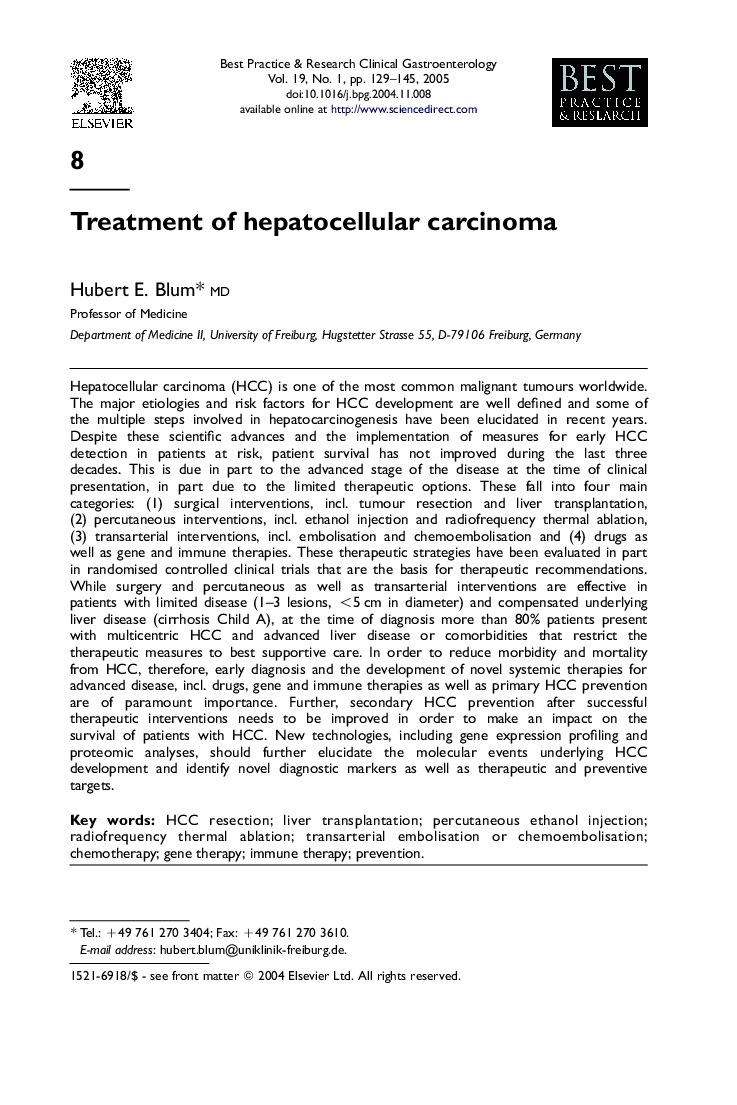| کد مقاله | کد نشریه | سال انتشار | مقاله انگلیسی | نسخه تمام متن |
|---|---|---|---|---|
| 9236154 | 1207224 | 2005 | 17 صفحه PDF | دانلود رایگان |
عنوان انگلیسی مقاله ISI
Treatment of hepatocellular carcinoma
دانلود مقاله + سفارش ترجمه
دانلود مقاله ISI انگلیسی
رایگان برای ایرانیان
کلمات کلیدی
موضوعات مرتبط
علوم پزشکی و سلامت
پزشکی و دندانپزشکی
غدد درون ریز، دیابت و متابولیسم
پیش نمایش صفحه اول مقاله

چکیده انگلیسی
Hepatocellular carcinoma (HCC) is one of the most common malignant tumours worldwide. The major etiologies and risk factors for HCC development are well defined and some of the multiple steps involved in hepatocarcinogenesis have been elucidated in recent years. Despite these scientific advances and the implementation of measures for early HCC detection in patients at risk, patient survival has not improved during the last three decades. This is due in part to the advanced stage of the disease at the time of clinical presentation, in part due to the limited therapeutic options. These fall into four main categories: (1) surgical interventions, incl. tumour resection and liver transplantation, (2) percutaneous interventions, incl. ethanol injection and radiofrequency thermal ablation, (3) transarterial interventions, incl. embolisation and chemoembolisation and (4) drugs as well as gene and immune therapies. These therapeutic strategies have been evaluated in part in randomised controlled clinical trials that are the basis for therapeutic recommendations. While surgery and percutaneous as well as transarterial interventions are effective in patients with limited disease (1-3 lesions, <5Â cm in diameter) and compensated underlying liver disease (cirrhosis Child A), at the time of diagnosis more than 80% patients present with multicentric HCC and advanced liver disease or comorbidities that restrict the therapeutic measures to best supportive care. In order to reduce morbidity and mortality from HCC, therefore, early diagnosis and the development of novel systemic therapies for advanced disease, incl. drugs, gene and immune therapies as well as primary HCC prevention are of paramount importance. Further, secondary HCC prevention after successful therapeutic interventions needs to be improved in order to make an impact on the survival of patients with HCC. New technologies, including gene expression profiling and proteomic analyses, should further elucidate the molecular events underlying HCC development and identify novel diagnostic markers as well as therapeutic and preventive targets.
ناشر
Database: Elsevier - ScienceDirect (ساینس دایرکت)
Journal: Best Practice & Research Clinical Gastroenterology - Volume 19, Issue 1, February 2005, Pages 129-145
Journal: Best Practice & Research Clinical Gastroenterology - Volume 19, Issue 1, February 2005, Pages 129-145
نویسندگان
Hubert E. (Professor of Medicine),